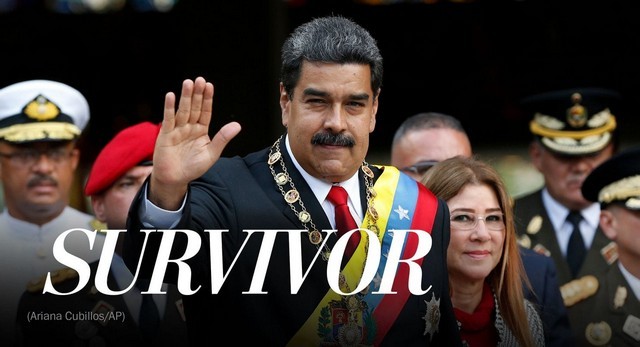By Ishaan Tharoor
In April 2002, then-Venezuelan President Hugo Chávez was briefly deposed in a coup attempt launched by mutinous army officers. But within 48 hours, Chávez surged back to power with the aid of loyalist generals and masses of supporters who marched in the streets in his defense.
It emerged later that the CIA had knowledge of the coup plot, despite the George W. Bush administration’s vociferous denials at the time. There were documented links between Washington and anti-government figures involved in the botched ouster. The specter of yanqui imperialism loomed once more.
Chávez, a fiery demagogue, made hay of those revelations, linking his own ordeal to a wider American legacy of dirty wars, election interference and military interventions. “Having a government of this type in the United States is a threat to the world,” he declared.
Sixteen years later, it can be plausibly argued that the government Chávez bequeathed to Venezuela is a threat to the world. Years of mismanagement and cronyism have hollowed out the Venezuelan economy, triggering mind-boggling hyperinflation and devastating food and medicine shortages. A hemispheric humanitarian calamity is now straining Venezuela’s neighbors, who are struggling to cope with the vast influx of refugees fleeing hunger and depredation.
For more than a year, analysts have suggested that Chávez’s successor, Nicolás Maduro, could be vulnerable to a coup. Maduro and his allies have withstood several murky attacks from renegade soldiers, including an apparent assassination attempt with an explosive-laden drone during a military parade last month. But rather than losing his grip on power, Maduro has only tightened it, purging the military’s ranks of potential threats and winning reelection in votes largely considered fraudulent by the international community.
All the while, he keeps blaming outside actors — chiefly, the United States — for his nation’s woes. And this weekend, he got even more fuel for his paranoia.
According to my colleagues, officials from the Trump administration met several times with Venezuelan military officers who claimed to be coup-plotting dissenters. The Venezuelans’ requests for covert aid were ultimately rebuffed, not least because the Americans were hardly convinced by their entreaties.
“We had very little confidence in the ability of these people to do anything, no idea at all about who they represented, and to what extent they had not exposed themselves already,” one official told my colleagues. But the new details, reported first by the New York Times, were more than enough for Maduro’s government.
“We denounce before the world the United States’ intervention plans and help to military conspirators against Venezuela,” tweeted Jorge Arreaza, Venezuela’s foreign minister.
The White House rushed to subdue speculation that it wants to intervene. In a statement, National Security Council spokesman Garrett Marquis said that “the United States government hears daily the concerns of Venezuelans from all walks of life — be they members of the ruling party, the security services, elements of civil society or from among the millions of citizens forced by the regime to flee abroad.”
The statement added: “U.S. policy preference for a peaceful, orderly return to democracy in Venezuela remains unchanged.”
Of course, such a return is nowhere in sight. President Trump, meanwhile, has played the part of the hectoring American hegemon rather well. His administration included Venezuela among the mostly Muslim-majority countries targeted by Trump’s travel ban, shutting the door to a nation in desperate need. He has touted the “military option” for Venezuela — rhetoric that sent sirens ringing on a continent all too familiar with American interventions. And reports indicate that Trump floated the possibility of an invasion not only to his top advisers, but to leaders of other Latin American countries.
But even were such an adventure now in the works, the new revelations suggest that Washington’s allies on the ground would be woefully out of their depth. “The main request of the military plotters was encrypted radios, which they planned to use to communicate among themselves in order to capture Mr. Maduro and his lieutenants,” noted the Times. “But the United States never granted the request, and after multiple meetings, the Venezuelans became frustrated. Mr. Maduro’s government has since jailed dozens of the conspirators, though many remain at large.”
In an era of smartphones and encrypted apps, the request for radios struck other Venezuelan observers as absurd. “It’s just another reminder that the guys atop the military—our putative saviors—are not only very, very criminal: they’re also painfully stupid,” wrote Francisco Toro of the Caracas Chronicles blog. “A plot that relies on people operating on this level of sophistication will only fail. Which, obviously, the Americans saw right away.”
“It makes no sense to support a military coup in Latin America. They always end badly, but it’s worth listening to these people,” said Adam Isacson, of the Washington Office on Latin America, to The Post. “What is their level of discontent? Do they have broad-based support among the population or are they just a bunch of renegades? Do they have an honest plan to start elections? The military is a black box.”
The irony of the moment is that Trump himself is careening down a dark path even as his administration puzzles over how to confront a destructive and destabilizing regime in Venezuela. Trump fulminated over threats to his rule posed, in part, by an anonymous insider who penned an astonishing op-ed on how Trump aides are protecting the country from the president’s consistently bad instincts.
“He’s remarkable in his lack of appreciation for democratic values and institutions. And I think that’s where some of the greatest damage is being done,” Sen. Bob Corker (R-Tenn.) told CNN’s Manu Raju last week. “Left to his own accord, our country would look somewhat like Venezuela.”
Ishaan Tharoor writes about foreign affairs for The Washington Post.
10 September 2018
Source: https://www.washingtonpost.com/world/2018/09/10/trump-venezuela-prospect-coup/?utm_term=.63252402b32b

